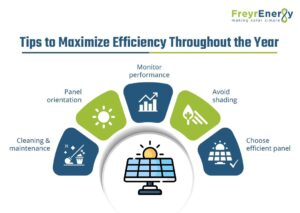Solar energy systems are becoming increasingly popular as a clean energy source. Households, commercial establishments, and large industries are moving towards solar to power their energy requirements.
Do seasonal changes impact the performance of solar panels is a question for many. This blog is to help you understand the working of solar panels in different seasons and factors affecting their best performance
Working of solar panels in different seasons
In summers
- Days are longer in summer, and there is abundant sunlight continuously.
- Energy production is at its peak during summer.
- Contrary to popular belief, extremely high temperatures in the summer can reduce the working efficiency of solar panels.
- Summer temperatures of more than 25℃ can have a negative impact on the energy production capacity of panels.
In winters
- Days are shorter in winter, hence there is lower exposure to sunlight.
- Despite winter temperatures being low, solar panels can perform efficiently as they work on light and not solar heat.
- Low temperatures enable the optimum performance of solar panels as heat-related negative effects on the panels are reduced.
- Clear skies in winter allow panels to capture sunlight more effectively, giving steady performance during the day.
- In northern regions, fog may reduce morning efficiency, but panels recover output once the sun is stronger
In the rainy season
- Though solar panels continue to generate energy during the rainy season, the output is much lower compared to summer.
- Dark clouds cover the sunlight and prevent it from reaching the panels, impacting their optimal performance.
- Severe storms or lightning during rain may impact the structure of solar panels.
- One advantage of rain is that the panels are cleaned of any dust and grime, leading to their better performance.
- Also, low temperatures prevent overheating of panels and extend their lifespan.
Effect of temperature on solar panel efficiency
Solar panels are made up of photovoltaic cells that absorb sunlight to convert it to electricity in a usable form by households.
It is important to note that solar panels function by capturing sunlight and not the sun’s heat. This is the reason they generate energy even in winter when temperatures are low.
Low temperatures are supposed to improve the conductivity of solar panels, thereby accelerating their ability to convert light into electricity.
Hence, with an increase in temperature, solar panel efficiency is considered to decrease, leading to lower output and vice versa.
Other factors that influence solar performance
Cleanliness of panels
The performance of solar panels is affected when they are covered with dust and debris. Regular cleaning and maintenance are essential to ensure the uninterrupted functioning of panels with high efficiency.
Shading
Energy generation can slow down when solar panels are placed in shade. The shaded cells can prevent the flow of energy and thereby impact the performance of the solar system.
Orientation of the roof
Solar performance in rooftop installations can be affected if the orientation of the roof is not perpendicular to the sunlight.
Sunlight
The intensity of sunlight received by the panels during the day can affect solar performance.
Material used
The type and quality of materials used in solar panels can impact their performance.
Tips to maximize solar panel efficiency throughout the year

Periodic maintenance
Regular cleaning and maintenance of solar panels by expert solar companies can help extend their life. They should be kept free of any dirt, debris, or any other accumulations to enable optimum performance.
Panel orientation
Solar panels should have maximum exposure to sunlight to function effectively. The use of solar tracking devices can help maintain the orientation of panels to stay perpendicular to sunlight through all seasons.
Monitor performance
Regular monitoring of performance through a solar app can reveal any defects in the functioning of panels at an early stage. This helps in addressing the issues without impacting the performance of the panels
Check for shading
Shading can affect the optimal performance of solar panels. Check regularly to see if shade from trees or other obstructions is present and take steps to remove them.
Panel type
Choose high-efficiency solar panel types such as monocrystalline, bifacial, or TOPCon panels that can generate more energy consistently across different times of the day and varying seasons.
Conclusion
Solar panels perform well in all seasons, though their optimal output may differ. Irrespective of the season, you can derive great benefits from solar systems. They play a crucial role in mitigating climate change in the world.
If you are planning to go solar, this is the right time. Reach out to experienced solar companies who can guide you through the entire process.
